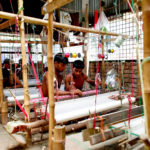In this project, the research team study whether worker turnover contributes to the misallocation of talent in low-income countries. To this end, they will experimentally evaluate the impacts of offering financial incentives for worker retention in the context of a female-dominated occupation in the nascent garment manufacturing industry in Ethiopia. Our main hypothesis is that…
RCT
The Roles of Information and Search Frictions in Determining Working Conditions in Bangladesh’s Apparel Sector
The emergence of low-skill manufacturing sectors in developing countries can increase labor market opportunities and provide other economics benefits for women (Heath and Mobarak, 2015; Tanaka, 2017). But in light of the poor conditions that characterize many low-skill manufacturing sectors, some researchers have questioned whether manufacturing jobs are actually better for workers than their alternatives.…
Overcoming Constraints to Female Labour Force Entry
We propose a randomised controlled trial to test the impact of two low-cost interventions to overcome psychological and information constraints to female labor force participation (FLFP). Our research questions are, does (i) motivating female students and (ii) providing information about the job market, promote female labor force entry, as measured by their likelihood of applying…
Relaxing Seasonal Constraints to Improve Labour Productivity
Despite increased investment and international competition in agriculture, small-scale farming continues to be the most common economic activity in many developing countries. In Zambia, 60% of the population lives in rural areas, where 78% of the population were employed in agriculture in 2012 (Zambia Labor Force Survey, 2012). Rainfall patterns in Zambia allow for only…
Impacts of Microfranchising on Young Women’s Occupational Choices
Youth underemployment is a major challenge facing developing nations, particularly in Africa (Filmer and Fox 2014). Young people are more likely to be unemployed than older adults (Kluve et al. 2016). In low-income countries, unemployment figures also typically underestimate the proportion of youths who cannot find productive jobs (Fares et al. 2006). After leaving school,…
Training, Financing, and Matching between Workers and Firms
Small and Medium Enterprises (SMEs) play an important role in income and employment generation in local economies, and SMEs account for a large share of businesses in low and income countries (LMICs). SMEs in LMICs are concentrated in activities that are described as unorganized or unregistered, or non-institutional. These SMEs have limited access to financial…
Addressing Gender Inequalities in Earnings and Productivity in Sub-Saharan Africa through Innovative Approaches
Youth employment and micro, small and medium sized enterprise (MSME) development are often in the public debate. Governments in Africa have introduced a number of programmes to promote employment via these mechanisms, but the understanding of which interventions are most effective and for which types of individuals they have an impact is limited. Furthermore, women…
Punjab Economic Opportunity Program
The Punjab Economic Opportunity Programme: Evaluating Markets for Skill Acquisition and Employment project has examined the complete scope of all relevant decisions being made in the vocational skills market in target districts in Pakistan. This includes determining what courses to offer, examining the drivers of low take-up, relieving access constraints to markets, and returns to…
High-Risk Youth in Post-Conflict Liberia
How can governments and NGOs raise employment and reduce the risk of violence among these poor and risky populations? Aid programmes increasingly focus on helping youth through markets, especially through microenterprise development. The logic of this assistance, however, rests on the existence of market failures among the poorest of the poor: imperfect credit markets, or…
Building Management Hierarchies for Growth in LICs
We evaluate the impact of and demand for mid-level management training in a group of garment factories in Bangladesh. Industry participants recognise that there exists a shortage of skills needed to fill in lower-level management positions. There are several reasons firms may fail to provide socially optimal levels of training, and the project is designed…









